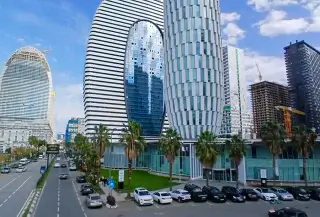read also
 Spring Break shifts toward private luxury villas: trend changes
Spring Break shifts toward private luxury villas: trend changes
 Albanian rents rise as investment returns fall
Albanian rents rise as investment returns fall
 Italy Raises Flat Tax to €300,000
Italy Raises Flat Tax to €300,000
 Storm Kristin Reprices Portugal Property Risk
Storm Kristin Reprices Portugal Property Risk
 London Heathrow Airport: 228 Delays and 48 Flight Cancellations
London Heathrow Airport: 228 Delays and 48 Flight Cancellations
 Batumi Housing Market: Prices Rose by 17% in 2025 — TBC Capital Report
Batumi Housing Market: Prices Rose by 17% in 2025 — TBC Capital Report
Вusiness / Real Estate / Investments / Analytics / News / Reviews / China / Real Estate China 23.10.2025
China to Task State Firms with Buying Unsold Apartments from Developers

Photo: Unsplash
Chinese authorities are considering enlisting state-owned enterprises to purchase unsold apartments from financially strained developers, Bloomberg reports. The move aims to accelerate the clearance of excess housing stock and reduce developers’ debt burdens. Analysts, however, doubt the impact will be significant, noting that state entities themselves face funding constraints.
Beijing is preparing a plan under which major state-owned enterprises and managers of distressed assets—including China Cinda Asset Management—could buy units that failed to find buyers. They would be allowed to tap up to 300 billion yuan (about $41.8 billion) provided by the People’s Bank of China. The funds are intended to support the market and partially rescue developers who for several years have struggled to sell completed housing.
China’s property market took off in the late 1990s when private sales were first permitted. Urbanization swept in millions, and construction became one of the economy’s primary engines. By 2019, the combined value of the country’s housing stock reached $52 trillion—twice the size of the U.S. market. The sector accounted for up to 25% of GDP and about 80% of household assets, but growth relied on cheap credit and ever-rising debt.
Leading developers built ahead of demand using borrowed funds. Founded in 1996, China Evergrande Group grew during the boom into the country’s largest—and most indebted—developer. By 2017, Evergrande’s market value exceeded $50 billion, yet by 2021 its total liabilities had swelled to $360 billion.
In 2020, Beijing sought to curb overheating by imposing strict leverage thresholds—the so-called “three red lines.” That effectively shut developers out of credit. The Covid-19 pandemic worsened the crisis: construction stalled and sales plunged. In 2021, Evergrande defaulted on $300 billion of debt, triggering the most severe industry downturn in a decade. Country Garden and Sunac subsequently went bankrupt as well.
Authorities tasked Huarong Asset Management and Cinda with debt restructurings and with acquiring halted projects. In 2023, the central bank channeled 80 billion yuan of low-interest loans to developers through these entities, but the program delivered weak results. August 2024 saw the sharpest housing-price drop in nine years. For the year, developer Vanke reported a record loss of 49.5 billion yuan ($6.8 billion).
The government allowed developers to use more presale proceeds, allocated 200 billion yuan in loans to complete frozen projects, cut taxes, and eased purchase restrictions. Yet the crisis continues to deepen. In 2025, China Evergrande Group said the Hong Kong exchange would delist its shares. Excess floor space is estimated at 408 million sq m—larger than the entire area of Detroit. According to Bloomberg Economics, around 60 million unsold apartments remain; without support, selling them off could take more than four years. Mortgage delinquencies have risen to a four-year high, and families have begun offloading homes at steep discounts.
Transaction volumes at the top 100 developers have fallen by more than 20% for two consecutive months. UBS analysts now forecast a market recovery no earlier than H2 2026. Meanwhile, authorities are refraining from massive stimulus. At a July urban development conference, President Xi Jinping called for accelerating the shift to a “new model” of housing that promotes more balanced urban growth. Investor expectations of bold measures, however, remain unmet.
Price declines have not revived demand: buyers remain cautious, and the market stays under pressure. Bloomberg estimates that even with state firms stepping in to buy inventory, the move is unlikely to be a game-changer. Without additional funding—and without addressing the mismatch between regions awash in unsold housing and areas with real demand—the market is unlikely to recover. It remains in its most difficult state in a decade.
Подсказки: China, real estate, housing market, developers, SOEs, PBOC, Evergrande, Country Garden, Vanke, three red lines, mortgages, Bloomberg, UBS, Xi Jinping


